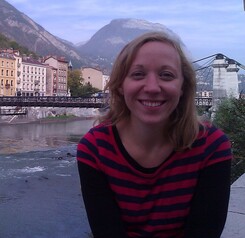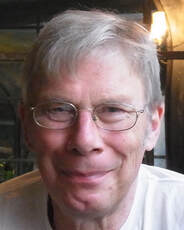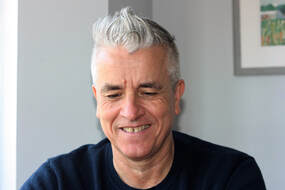|
Short Fiction ~ Rachel O’Cleary First Prize, Strands International Flash Fiction Competition - 9 Her She grips the rough bark between her knees, grunting as she reaches higher, hands already pink and stinging. Splinters pierce her palms and thighs, but she continues, eyes reaching up, only up. She stops. This is it. This is the one. She hoists one leg over the branch and stretches - head out, toes curled against the trunk. The branch wobbles, but she hugs it tightly, inhaling earthy bark and tangy orange leaf. Her heart stops walloping and settles instead into a smooth roll. She rests, eyes half-open, and breathes with the tree. In. Out. In. Them Mum is nowhere to be seen. Her car is in the driveway, but no healthy snack awaits them on the table, no strident voice orders them out of their uniforms. Their calls race round corners and up stairs. It is the boy who finds her, being just young enough to think of looking for his mother in a tree. His sister doesn't believe him, but not knowing what else to do, she finally comes. Her eyes, round and clear as bubbles, rise to meet her mother's. The boy giggles and shrieks at Mummy's game, but the girl only tilts her head. Her body stills, as if she is approaching a stray cat. “It's OK, Mum,” she coos. “You can come down now.” Mum grips the tree tighter and twitches her head slightly. Her eyes rest on the children for a moment, then close. Him He finds them sitting beneath the tree, chins tilted up. The boy is no longer having fun. He wipes the tears from his pink cheeks with his sleeve so Dad won't see. They tell him they have begged, promised good behaviour, even tried to tempt her down with chocolate. He cranes his neck. “Come on now,” he calls. “What are you playing at? Look at the children – who will take care of them?” She meets his stare, but says nothing, moves not a millimetre. “Shit,” he says. Goes to the shed. When he returns, saw in hand, the girl jumps up, pushes against him frantically. “No!” she shouts. “No, leave her! I'll make dinner. I'll put him to bed. Just leave her!” He brushes past. The chainsaw roars to life, and he stands holding it, watching his wife in the tree. Waiting. She doesn't blink. He finds the crotch in the tree that holds up her branch and presses the blade in. The whine of the saw becomes a deep growl. A puff of pale sawdust leaps from the tree and softly floats down to earth. He withdraws, pauses again. The children wail, mouths open, but he cannot hear them. His eyes lock on hers. Blade returns to branch, woodchips flying in all directions. The roaring and swirling mounts as the blade pushes further. A pale dust sticks to their skin, their sweat, their tears. And then, a sharp crack. Her eyes cool and placid, even as she falls. ~  Rachel O'Cleary is an emerging writer of short fiction and has a degree in creative writing from the University of Wisconsin – Milwaukee. She has recently worked as an English teacher in Poland and France, and currently lives in Ireland with her husband and three children.
4 Comments
Short Fiction ~ Bruce Meyer Second Prize, Strands International Flash Fiction Competition - 9 Did I remember the path beside the lake where the maples bent over the cinder path and reminded her of a cathedral she visited in France when she was ten? There was no path beside the lake. “Yes,” she insisted, “you were there. We walked slowly. You held my hand. Wind rustled through the leaves. You said it would rain by midafternoon and it did.” We had never been to such a place. I reminded her of the beach, the hot July sun turning sand into a frying pan in the late afternoon, and how she was afraid her water-puckered feet would blister if she walked to the cottage without her sandals. “Did we hear the ocean?” “All day,” I said. “Did I burn?” “No. I put lotion on your legs. I rubbed your arms and back with it, and you went back to sleep.” “Then? Then did we walk beside the lake?” “There was never a lake.” “But I remember the canoe, the paddle dipping in the water, the trail of silver droplets making haloes in the still surface, and how afterwards we stood on the verandah of the lodge and looked up at the stars. There were so many stars.” I wanted to tell her that she could only live one life at a time in her mind. “You are thinking of a time I was not there.” “But you were there when you lit a taper and touched it to the wick of the candle. You passed your finger through the flame and I was amazed it did not burn you. You told me to try it, but I was afraid. And when a moth that had gotten caught between the screen and the inner window flew free when opened the sash to let in some night air, it headed straight for the flame. It frightened me, and to calm me down you told me to make a wish.” “What did you wish for?” “I wished that you would always be with me. We would walk along the cinder path beside the lake and listen as the wind moved through the trees.” “I wish there had been a lake.” “But there was, and I wished that if you could not be with me in that moment, that wonderful moment when I felt so alive with you holding my hand, that you would find me again, and you did.” ~  Bruce Meyer is author or editor of over sixty-three books of poetry, short fiction, flash fiction, non-fiction, and literary journalism. His next book of flash fiction, Down in the Ground, will be published by Guernica Editions in 2020. He lives in Barrie, Ontario. Short Fiction ~ Bob Thurber Third Prize, Strands International Flash Fiction Competition - 8 Straight out of high school Mick’s uncle landed him and me second-shift jobs at a textile factory where everybody wore rubber headphones to muffle out the noise. Everybody except the old timers, who were already deaf. I can’t even tell you what the company manufactured, but they certainly made a lot of it. From three until midnight Mick’s uncle calibrated dozens of loom-like machines and repaired any that broke, while Mick and I hauled cartons of braid from the loading dock. When nothing needed doing it was fun to watch the machines suck up braid like giants slurping spaghetti, while high above dozens of spools and bobbins intertwined different colored fibers, crisscrossing with one another. Most nights, after work, we walked straight to the east side and grabbed a booth at the International House of Pancakes. Neither of us owned a car but Mick told the waitresses he drove a Cadillac with AC and power seats. He flirted and teased, and because we were good tippers the girls flirted back. After we’d downed enough coffee to fuel a tractor-trailer driver’s all-night run, we’d hike over to Riverside cemetery and linger by the cliffs, smoking Marlboros and talking nonsense until two or three AM. Sometimes we just gazed at the stars and moon reflecting off the black water. Mick’s sister was buried somewhere in Riverside, but we never went near her grave. Years before I met Mick, his sister had been strangled in her bed, on Easter, while everybody was at church. My mother remembered the whole story from newspapers and TV. She told me the police questioned everybody and in the end arrested nobody. Mick never talked to me about any of that, and I never mentioned I knew shit, though one night, while taking a shortcut, walking past old houses with dim porch lights and pitch-black windows, Mick picked up a stone big as a baseball. He wound up and pretended to throw the stone, faking me out. He did this house after house, telling me each time how nobody in this world should ever be considered safe and protected behind anything as frail as glass. ~  Bob Thurber is the author of 6 books, including “Paperboy: A Dysfunctional Novel". Over the years his work has received a long list of awards and honors, appeared in Esquire and other notable publications, and been included in over 60 anthologies. Selections have been utilized as teaching tools in schools and universities throughout the world. Bob resides in Massachusetts. He is legally blind. For more info, visit: BobThurber.net Short Fiction ~ Sara Siddiqui Chansarkar Third Prize, Strands International Flash Fiction Competition - 8 “Bahu, did you buy mangoes?” Mummyji, my mother-in-law, asks from her room at the back of the house. She’s old and paraplegic now, but her senses are still strong. As is her voice. I pay the produce seller in the porch for the fruits and vegetables I’ve bought and lock the front door behind me. “I smell them…mangoes,” she adds. Of course, you do. I smelled them too, for 25 years, I want to reply but don’t. After he’d married me off, every summer, my father plucked near-ripe fruits from the mango tree in his courtyard, washed them, packed them in a wooden box layered with straw, and parceled them to me at my marital address — this house, Mummyji’s domain. In the two days it took for the package to arrive by train, the mangoes turned soft and fragrant. “Only mangoes for his daughter. No sari for me or a kurta for my son,” Mummyji sneered at the mango carton, ordered my husband, Nitin, to carry it to her room and stow it under her bed. Nitin obeyed her command while she berated my father. “That miser of a man! He sent only pots and pans with his daughter. No cash, no gold coins. My Nitin is a junior engineer. Even boys with a B.A degree get a motorcycle in dowry these days,” she continued. “I thought he’ll compensate on festivals, but he proved me wrong. On Diwali, I have nothing to show when women from the neighborhood flaunt glinting necklaces or earrings from their daughter-in-law’s parents.” While I kept chopping green beans and potatoes in preparation for dinner, my thoughts drifted to my wedding night, the night I knew my kismet was doomed. After the guests left, I waited for my new husband. Nitin arrived with Mummyji to the doorway and touched her feet before entering our bedroom. She sang blessings for his long life and left. Nitin lifted my embroidered veil, raised my chin with his fingers and told me that his mother was the most important person in his life, that I was to respect and serve her at all times, without question or retort. He said nothing about how pretty I was or how excited he was about our life together. Without a college degree or a marketable skill, I had no choice but to depend on my husband and my mother-in-law. Day after day, Mummyji ordered me around, showed me my lowly position in the family hierarchy. I yearned to confide in my mother but she was dead, taken by dengue. My father, a schoolteacher, struggled to raise my younger brother and sister. I couldn’t return, be a burden to him. I smelled the mangoes my father sent in Mummyji’s room as I swept the floor under her watchful gaze and instruction, reaching the broom under the bed to gather dust and fallen hair. In the evening, Mummyji and Nitin ate while I served fresh, hot rotis to them. After the meal, every day, until the box was empty, Mummyji pulled out mangoes—my mangoes—from the carton, asked me to wash them. It took every iota of willpower in me to not bring those juicy orbs to my mouth, to take them back to her. As I scrubbed the dinner dishes after eating alone in the kitchen, my mouth watered at the sound of Nitin and Mummyji sucking in the juice and the pulp, at the thought of the golden sweetness gushing down their throats. How sweet those mangoes were from my childhood tree. How my mother used to squeeze them out to make aamras, which she served with puffed pooris. How the three of us, my brother, sister, and I, raced to the courtyard at the sound of a ripe fruit dropping to the ground. How we sat in a circle in our underclothes every night, eating the yellow mangoes, the juice dribbling down our mouths to our elbows to our clothes. How my father made us sit, one by one, under the tube well’s outlet while he worked the handle up and down, drawing water to wash us clean. At night, after Nitin was done with my body, I stayed awake, smelled the mango aroma wafting from the trash, and waited for his and Mummyji’s snores to fill the silence. Then, I sneaked into the kitchen, shooed away the rats, extracted the mango carcasses from the garbage, tore open the fruits’ skins, scraped the remnant flesh on them with my front teeth, licked the stones until they looked like oval faces framed with short, white hair. I wrote thanks to my father, said the mangoes were getting sweeter and juicier with each season. When he died, last year, the fruit parcel stopped. Today, I picked up a yellow mango from the produce seller’s cart at the doorstep. Now, after Mummyji took to bed, after 26 years of our being married, Nitin gives me money every month to purchase groceries. “Are these mangoes sweet?” I asked the vendor. “Sweeter than jaggery,” he replied. I pressed the fruit between my palms, felt its texture, brought it to my nose, smelled its ripeness, then put it down, and bought only spinach and tomatoes. I still felt Mummyji’s eyes on me, all the time. “Memsahib, buy these mangoes,” the vendor called out, as if sensing my desire and dilemma when I walked away. “They’re the last of the season. You’ll regret passing on them, I tell you.” My feet turned around and I bought two kilograms of the fruit. “Bahu, bring me a mango!” Mummyji screams. “Are you deaf?” I tear the top off a fruit, suck, and suck, noisily. She clinks a spoon to the bedrail to get my attention but she can’t have it or the mango. ~  Sara Siddiqui Chansarkar is an Indian American writer. She was born in a middle-class family in India and is indebted to her parents for educating her beyond their means. She is a Pushcart and Best of the Net nominee; her work has been published online in MoonPark Review, PidgeonHoles, Barren Magazine, and also in some print anthologies. She can be reached on twitter @PunyFingers. Short Fiction ~ Oliver Barton Honourable Mention, Strands International Flash Fiction Competition - 9 The train stops in a tunnel and the lights go out. I say to myself, I’m not going to panic, because you can feel the fear rising, you know, in spite of yourself. In detective stories and movies, things happen in the dark, in trains. Alive before the tunnel, emerge into the light; dead body. Remember Hitchcock’s The Lady Vanishes? I can do without this. I am tired of the boredom of it all. I just want to get home and have a drink and eat something in front of some stupid sitcom on the telly. Escapist unnatural jolliness. A ghastly hysterical studio audience. It is dark, but your eyes adjust, of course. There is light here and there. Phones, tablets, laptops, all filling their humans with images and messages. Now the train’s generators stop. Those talking too loudly on their mobiles fall silent. Perhaps they can’t get a signal. It is uncanny, unnatural. Dark. Darkish. Silent. Fairly silent. I can still hear a tish-tish-de-tish-tish from someone’s MP3 player. I wish someone would say something. ‘Perhaps…,’ I say. And stop because I can’t think of anything sensible. Then the computers and phones start winking out. In ones and twos. The tish-tish gets a bit louder. The last light vanishes, leaving a dwindling image on my retina. The tish-tish crescendos more and stops. It is dark now, and it is silent. It is impossible. How can so many batteries run down at the same time? Why does nobody speak? There is a faint hissing. Is it someone whispering? I can’t make out words. My eyes are playing tricks. I keep thinking there’s a flickering glow outside on the tunnel walls. And the hissing. It is hissing. I’m sure of that. I don’t want to think what it might mean. What is leaking… Take my word for it, in a situation like this, in darkness, when you don’t understand what is going on and something is hissing, your thoughts turn to mortality. The fragile span of life. Of what you were going to do, what you could do, today, tomorrow, next week, next year… I’m fifty-seven, I’m balding, I’m overweight, I admit it. I’m… I… Oh, be honest! I haven’t achieved most of things I thought I would. Just haven’t got around to them, put them off, couldn’t be bothered. Now, though, I terribly want to do them, to walk the Pennine way, to visit Malta, to write a book, to learn to swim, to get a more fulfilling job… Now there is an urgent need, now when perhaps it is too late. It’s making me a bit light-headed. I feel I’m floating on my seat. And there seems to be a slight breeze. My hair is being ruffled. I think I can smell smoke. Total darkness is no good for the nerves. Nor is the deafening whistle that drowns out the hissing, a whistle that echoes down the tunnel. Like a banshee. The train gives a violent lurch, and everyone is talking and we’re moving, picking up speed, and the smoky smell is getting stronger and I’m choking. We burst into the light in a cloud of steam. Someone in a seat on the other side of the carriage comes over and tugs on the leather strap to close the window. ‘You should keep it closed when we go into a tunnel, sonny,’ he says. ‘Otherwise the smoke all comes in. Filthy stuff. Don’t know what they’re burning these days. Coal’s not what it used to be before the war.’ Tickety-tak, tickety-tak, goes the train. Tickety-tak, tickety-tak. I look down at the rather grubby and grazed knees sticking out from my shorts, I run my hand through my unruly hair and realise that possibly, just possibly, I have another chance. ~  Oliver Barton used to write Computer User Manuals, but having retired, now prefers to replace telling facts that nobody reads with writing whimsical fiction that lots of people enjoy. He is currently at work on his second novel. He lives in Abergavenny, Wales. Website: www.musicolib.net, though it’s more to do with his musical compositions. Short Fiction ~ Palak Tewary Honourable Mention, Strands International Flash Fiction Competition - 9 She finished work, grabbed her old threadbare yellow satchel which she hated and rushed home. She had to go to the next shift and there wasn’t much time. Amy had been working three shifts for a while now – there never was enough money to scrap through and she really wanted to save enough to finish her A Levels and then go to college. She worked at the library, as a general factotum in a lawyer’s office and as a waitress. She studied late at night via a correspondence course, which her social worker had set up. She was to take her exams in six months and move on to the life that she dreamed about. Orphaned, in the wrong company at her foster homes and a bad decision in high school had led her down a path from which she had had a tough time trying to come back. But come back – she had – finally. It was her friend’s death through an overdose which had woken her up from the slumber she had found herself living in. Just eighteen, she wanted to pursue her dream of studying fashion designing. She loved clothes but looking at her now, no one could tell. She changed into her waitressing uniform of black trousers and a white shirt, covered herself with her dependable coat, pulled on her shabby black shoes with tattered heels, grabbed her abhorrent satchel and with a longing look at the kettle, rushed to the subway. It was a busy night and as usual, she served promptly and efficiently but unsmilingly. Everyone who knew her had never seen her smile. As the night deepened, she thought, at times, she would pass out from utter fatigue but respite came when she was able to take a break to grab some dinner. She fell on it ravenously thankful that the restaurant fed her. The rest of the time, she had to make do with cheap knock-offs from the supermarkets that were nearing the expiry date and had to be sold for less or had to do without food. She got to the station, exhausted. Alone, she sat down to wait the two minutes for the last train to come. Two men came down the stairs at the far end, one after the other. She watched them, having nothing better to do. One turned and she saw that he was short and bald, holding something that looked like a folder. He seemed to be gesturing something to the other taller man, walking backwards. She was surprised as they had come separately and she hadn’t realised they knew each other. The taller man with spiky short hair wore all black. And then, it all happened in seconds. The silence of the night was broken by a shrill shout and then a scuffle between the two. She was too far to see what had caused it and was too petrified to move. The short man broke free suddenly and pushed the taller one back. Taking the opportunity while the tall man gained his balance, the shorter one ran towards her and she jumped up in fright. But he didn’t reach her. A gun shot rang out and her breath caught – the man who was running towards her, stopped halfway and then fell to the floor, his dead open eyes eerily watching her. She stood distraught as the other man approached her, his hand upright holding the gun, his lips turned in a vicious sneer, his face one that she would never forget. She looked around to find a way to escape. She had a few moments as he was too far for a clear shot. She inched towards the tracks. Miraculously, she heard the faint sound of the train approaching. The man heard it too and with a bellow, started to come faster towards her. She sprinted to the end of the platform as the train pulled in. The doors opened and a shot sounded behind her – with a yell and in agonising pain, she fell inside the train and the doors closed. As she lay there in a growing pool of blood, her eyes started to shut. Her life’s journey flashed before her – she saw a vision of her future-self graduating from college. In those few moments, she felt a lifetime of regrets wash away and all her dreams turn to ashes. Then there was light, and noise – there was the sound of an ambulance or perhaps it was a police siren and someone calling. Were they calling her? She couldn’t tell, sleep beckoned her. She didn’t hear the shouting or the patter of the feet around her, she didn’t know the train was stopped and her assailant captured by the police, she hadn’t seen the stranger in her compartment call for help. When she woke, she found herself looking at the white walls of a hospital room. She was alone with a familiar beeping sound and a strange bubbling noise. She looked around for water. As she wondered what to do, a nurse came in, smilingly and exclaimed “You are awake” and then bustled about to get her the next dose of medicine. Amy weakly asked for water and as the nurse gave her some, she said “You are lucky. Had that last train not come or that satchel of yours not been there, you would have surely died.” Amy’s eyes involuntarily went to her old satchel sitting on one side, sporting a large hole through which the bullet must have passed through – it was that, she now knew, that had saved her life. She had been given a new lease in life - a second chance – to be happier, to not only look at the burdens in life, to be grateful and to let go of regrets. And for the first time in many years, she smiled. ~  Palak Tewary, an Indian-born Londoner, is a management/finance professional, who along with being an ardent writer, is a travel buff & photography/videography enthusiast. She blogs at www.palaktewary.com and writes fiction, non-fiction and poetry – some of which has been published on various platforms. Connect with her on YouTube/ Twitter/ Instagram on @palaktewary. Short Fiction ~ Stephen Smythe Honourable Mention, Strands International Flash Fiction Competition - 9 Granny mimicked James Cagney, danced to Boy George, borrowed money from herself, slipped me ten bob on my birthday and drank eleven mugs of tea every day, never leaving one unfinished no matter how cold it got. When she’d smoked all her Park Drive, she used the empty packet for her weekly budget. Her columns of pounds, shillings and pence were barely visible to the naked eye, yet they were crystal clear to her. She didn’t need specs until she was way into her sixties, so didn’t have to remove any the time she punched a skinhead. I was ten, which would have made Granny around fifty, and we were in a café at the city zoo. The skinhead, who was across the table from us, was scowling at a girl next to him. He called her “Slut” and gritted his teeth. The girl’s cheeks reddened and she lowered her eyes. Granny’s cheeks were also flushed but her eyes were blazing. “What you lookin’ at!” the skinhead, sneering, said to Granny. Granny stood up and walked around to where he was seated. “Pardon?” Granny said. “You need a hearing aid, Grandma?” he said, leaning back in his chair. Granny socked him flush on the jaw. Her knuckles swelled afterwards but she said she didn’t feel a thing at the time – except satisfaction. He remained seated, open-mouthed. Granny stood over him, all five foot two of her, fist cocked ready to deliver another right cross. The girl smiled and the skinhead skedaddled. Granny was always there for me. I wish she were here now, so I could pick her up like I did when I grew bigger and she got smaller. “Put me down!” she’d yell, laughing chestily. She left school at fourteen, in 1926. Jobs may have been scarce nationwide but not for Granny who lived a few minutes’ walk away from the burgeoning Trafford Park Industrial Estate, built in the north of Victorian England on what was once deer land and meadows. She walked into the offices of Ford Motors and asked about vacancies. The supervisor liked Granny’s initiative and gave her a job right there. It was after two years at Ford Motors that Granny met Harry Turner, a new accounts clerk. He was eighteen. It was a brief courtship and a hasty marriage: Granny was three months’ pregnant with Mum. I discovered this after Mum died and I was looking through papers stashed in a shoe box, found buried away at the bottom of Mum’s wardrobe. I never knew Harry Turner, Grandad, nor what he looked like. There were no photographs. Granny didn’t talk about him. Whenever I said, “Tell me about Grandad,” she’d roll her eyes, or change the subject. Like Granny, Mum didn’t mention Grandad. The stories I heard about him came from Dad: how Grandad met Granny, how he gambled his wages at White City Greyhound Stadium, always had a Woodbine dripping from his lip, and that he drank too much. At the age of 39, he was so drunk he slipped off his own balcony to his death. Granny was a Catholic. She went to confession on Friday, mass every Sunday and always took Holy Communion, right up until having a stroke when she was 81. She was to live another six months. The week before Granny died, we were in her flat on the top floor of the five-story block where she’d raised Mum. She refused to be rehoused even though the lift often broke down. “I’ll manage” she said, “I always have.” It was hot but she was wearing a woollen shawl, seated in her armchair, tepid mug of tea in one hand, a lit Park Drive in the other. Her left cheek sagged slightly but her speech was clear enough. I asked her one last time to tell me about Grandad. “Please, Granny.” She rolled her eyes. “What’s the big secret?” I asked. “It can’t be that bad.” She smiled, lopsided, and spoke slowly. “It was Sunday night. I’d been to mass with your Mum. We ate supper and she went to bed – she had school the following morning. I was reading, one eye on the clock, waiting for…” she hesitated “…waiting for him to come home. I used to dread eleven o’clock – chucking out time at the pub. “I heard the key in the front door and I went stiff. He staggered in, stinking of booze. He went straight to the balcony door and let in the cold air. I can see him now, smirking in the doorway, slurring his words, “’Cheer up you miserable cow!’” Granny stopped speaking and drained her mug. “He was shouting how he wished he’d never married me. That I’d trapped him by getting pregnant. He was always saying that. “I thought he was going to wake your Mum. I stood and said, ‘If you don’t like it, pack your bags.’ He gritted his teeth. ‘Don’t answer back!’ he shouted. He punched me and my head banged against the wall. He’d cut my lip, again.” Granny’s eyes blazed as she looked beyond me. “He pointed to the kitchen, told me make him a sandwich, and went outside. I looked in the mirror and saw the mark he’d made on my jaw. It’s a wonder the bruises ever disappeared.” Granny stroked her face, the side that sagged. “I could see in the mirror that he’d climbed onto the balcony ledge. He was shouting and waving his arms, pretending to fly. A light from a flat across the road went on and off. “I wiped the blood from my mouth and walked out onto the balcony. It was dark and nobody was around. He looked down at me, arms swaying, and sneered. ‘Where’s my sandwich?’ “I felt my swollen lip. His legs were within easy reach. I thought, ‘Who’d ever know?’” Granny waved her cigarette smoke away from me. ”And nobody does know,” she said, her eyes softening, “except God, me – and you.” ~  Stephen Smythe lives in Manchester, England, and completed an MA in Creative Writing at Salford University in 2018. He was shortlisted for The Bridport Prize (Flash Fiction Category) in 2017 and shortlisted in the Bath Flash Fiction Award 2018. He was also placed second in Northern Ireland's Bangor Literary Journal FORTY WORDS Competition in 2019 and this year he was Highly Commended in the same competition for his micro-fiction. |
StrandsFiction~Poetry~Translations~Reviews~Interviews~Visual Arts Archives
April 2024
Categories |
 RSS Feed
RSS Feed